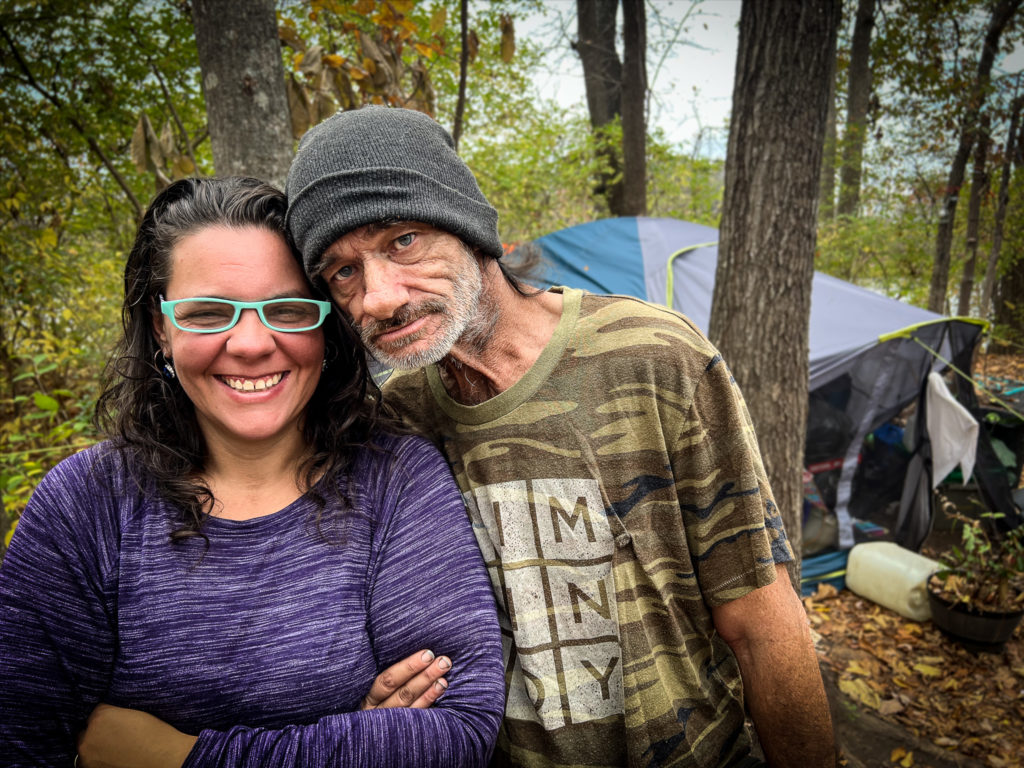
Sandwiched on the edge of busy parking lots, a chainlink fence blocks most of the entrance to Brookmeade Park in West Nashville. Still, there’s a steady trickle of residents coming and going from dozens of tents. Some push shopping carts.
Liz Mallard watches people she knows — and some new faces — pass by the place she lived for more than a decade. She says many of those living at the park have lost hope of their lives changing.
“It’s not a home. It’s not a park,” she says, “it’s survival mode.”
It’s not new for people to be living in Brookmeade. But as the population at the camp spiked in recent years, so have community tensions, including anger over crime and drug use.
At pandemic peak, more than 100 people lived on this half-mile stretch of greenway. And as nearby residents lost use of the park, they’ve become frustrated, gotten organized, and demanded that officials intervene to clear the area. The city and nonprofit partners have made moves to transition people into housing — and intend to do more soon — but the arrangement hasn’t satisfied anyone.
For her part, Mallard has been in housing for just over a year. After some serious health concerns, she’s says her sobriety is sticking this time.
“When I first got my apartment … I felt guilty,” she says, “I was happy, but there was guilt because I’m like, ‘Why me and not them?’ ”
She says she had a lot of help getting to where she is now, and put in the work of navigating through applications and waiting periods.
“It’s a process,” she says, “and you have to remind yourself it’s gonna happen. It’s a process. But when you hear that so many times, you start giving up.”
Mallard now volunteers with Colby’s Army. It’s a nonprofit that’s been working in the park since 2010, when there were about a dozen residents. She believes people shouldn’t be forced to leave the park until they have a stable place to go.
“You push ’em outta here, they’re gonna go to another camp area or they’ll create their own.”
Metro says 35 people from the camp have gotten into permanent housing over the last year. That’s in part because of a new approach in which Metro provided a transitionary shelter near Brookmeade.
But while all of this churns, there are still 40 to 50 people living there — like David Patterson.
“I’ve been trapped here three times in the last 10 years,” he says. “Seems like every time I get away for a while, something ends up dragging me back to this god-awful place.”
Patterson, a Marine Corps veteran, says everyone’s efforts are not working for him and his wife. The city tries to prioritize housing aid based on a scale of vulnerability, and Patterson says his outreach worker told him they’re not very high on the list. So they’re at risk of being displaced again — from the park — while housing remains scarce.
“You know, some of the bad things that happened to some people hasn’t happened to us,” he says, “We’re at the bottom of the list, and I don’t think that’s right.”
Metro, backed by an additional $50 million in pandemic relief funds, says they’re working to get housing for more people living outdoors.
Leaders plan to expand the program that provided shelter options in areas away from downtown; to increase gap housing options; and to further incentivize landlords to dedicate units to an initiative meant to house people who traditionally run into barriers.
“The most critical piece will come from the ability to now expand the wraparound services needed to ensure our neighbors not only receive housing options but get the support needed to succeed in the new environments,” says Harriet Wallace, spokesperson for the Metro Homeless Impact Division.
A newly created Encampment Prioritization Committee will be meeting for the third time next week to discuss specific campsites and strategy. Brookmeade Park appears likely to be one of the first campsites to get more attention.
As long as there’s actually a place to go — Patterson says he’s ready.
“This just isn’t my style of living here,” he says. “It’s below subhuman in my opinion.”

